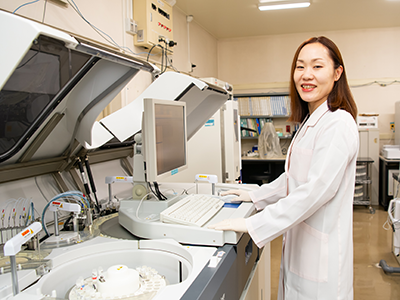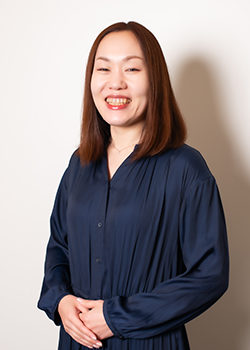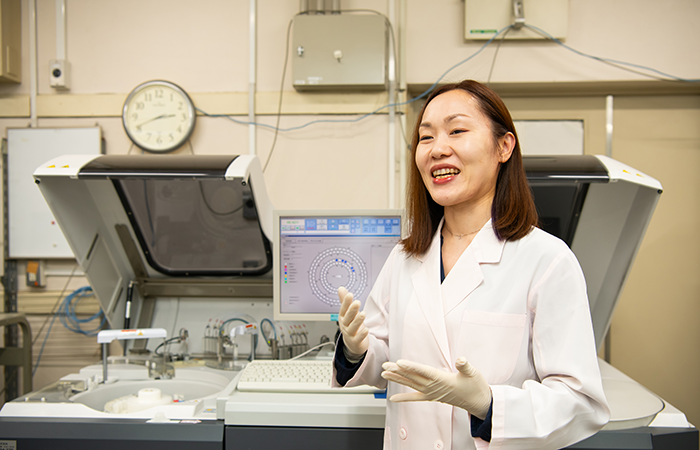Tackling the Inspection Work that Interested Me as a Student on a Day-to-Day Basis
BRC is supported by a diverse staff who are involved in a variety of tasks. We have interviewed staff members from each of the 12 laboratories that make up BRC, asking them about their activities and their day-to-day efforts in their research rooms.
This time, we are speaking with Akiko Shinogi, who works in a Technical Staff II position in the Mouse Phenotype Analysis Division.
She obtained a national qualification with the intention of finding a job that would allow her to perform experiments. We asked Shinongi, who is active in learning about resources and related techniques and knowledge, about how she approaches her work and what she finds rewarding.
Until I could land my dream job where I could conduct experiments
Gathering information in order to seize opportunities
I wanted to become a laboratory technician because I have always been fascinated by experiments and testing equipment. When I was in elementary and junior high school, I really enjoyed doing experiments during science class. I was also very interested in the supplements published with Gakken’s study magazine Science. I wanted to get a job where I could do experiments, but because my family lived in the countryside, the types of work available to me were quite limited. I did some research and learned that the local hospitals had jobs for clinical technologists, whose primary work involves experimentation, so I studied at a specialized school and then found a job at a testing center in Tokyo. However, when I first joined the center, it was hiring only a small number of laboratory technicians, and it was difficult to find a position in a division where I could perform genetic testing, which I had been interested in as a student.
At that time, there was a job opening in a different division from the one I belong to now, so I applied for it. After hearing about my wishes during the interview, the manager at the time recommended that I register with a temporary staffing agency, saying that this job was not a good match for me. Sometime later, an opening came up for a job involving mutation analysis, for which I had acquired the necessary skills in my student days, and so I joined my present division as a dispatch worker. I was really happy about this and I told myself, "I’m glad I did it," because I had been told both when I was a student and also when I worked at the hospital where I did my internship that the number of clinical technologists working in hospitals on detecting gene mutations would decrease in future as more and more hospital testing was going to be outsourced.
By gathering information and consulting with other people, I was able to organize my feelings and take action when the right opportunity arose. Moreover, by taking action, I was able to meet people, and I may also have been able to realize my dream even if it was by a different route than other people have taken.
Supporting domestic and international medical research through mouse testing
The magic spell of the plant kochia that enhances the power of concentration

The Mouse Phenotype Analysis Division, of which I am a member, conducts phenotyping analysis of mutant and genetically engineered mouse strains. This analysis increases the added value of mouse resources and contributes to the development of our resources and intellectual infrastructure. In addition, we participate in the International Mouse Phenotyping Consortium (IMPC) and contribute internationally to a number of mouse phenotyping analysis projects.
I am in charge of testing for phenotyping analysis of genetically modified mice. From the time I joined the Division until about 2018, I was performing genotyping (*1) tests using PCR. Moreover, when I was a student, there is a test called the TaqMan probe test (*2) that I worked on for my graduation project, and I used it to investigate mouse strains.
I have now moved to the Blood Team, where I collect blood and other samples for scientific analysis to investigate changes in the body caused by mutant genes. There are three members on the team, and our usual work consists of desk work involving between one and three of us, such as taking blood samples from mice, preparing samples and measuring them with instruments, and working on a computer.
The number of tests varies from time to time. I am the type of person who enjoy doing things accurately and quickly, even when the job involves a large number of tasks, so that doesn’t bother me very much. Even so, there is a Japanese proverb that comes to mind when I try to motivate myself, especially when there are a lot of tests to do: Me wa okubiyo; Te wa oni, which can be rendered in English as: "Eyes are cowardly; hands are devilish." The meaning of this proverb is that "Even if you are intimidated when you see the huge mountain of things that need to be done, you can somehow get through it as long as you keep your hands moving."
These words also came to mind when I heard on the TV news that Kochia Hill in Hitachi Seaside Park [in Hitachinaka, Ibaraki Prefecture] was planning to plant 32,000 seedlings of kochia, which is also known as summer cypress, by hand, one by one, over a period of about two weeks. Since then, whenever I have to do a large number of tests, I move my hands and head while chanting "kochia, kochia ……" in my mind like a magic spell. Then, when I concentrate on the work in front of me, I am able to handle it accurately and smoothly, which gives me a sense of accomplishment.
Speaking of a sense of accomplishment, in my current division, in addition to my regular duties, I am able to learn specifically about my main area of interest and the technology associated with it. I also have the opportunity to interact with people from other divisions who are working in different fields, such as on RIKEN BRC’s five major world-class bioresources and their related information, which allows researchers to actively gather information on what they want to know. Even technical staff members can make proposals to the director of the division about what they are interested in and can proceed with their research independently, so I think people who want to challenge themselves in a variety of areas will find this a rewarding career.
People who have influenced me and things that I value
When I think again about the people who have influenced me, the first people who come to mind are my parents. They were dry-field farmers in my hometown, and I helped them in the fields from a young age. My mother was very fast and accurate in her work, and I still can’t match her speed. My father, on the other hand, began farming on his own initiative, and he is very honest as a farmer. He carefully observes the crops he harvests, and although this makes him a slow worker, he has overcome many natural disasters, including a record-breaking cold summer, thanks to his careful observation and sincere handling of his work. Although I have chosen a different path from my parents, I occasionally see them both in myself as I work.

What I value most in my work is honesty and sincerity. I believe that people who are honest naturally want to help those around them, and if they are sincere, they will naturally not cut corners, and they will follow procedures and ensure that their data is honest.
The phenotyping analysis of mutant and genetically engineered mouse strains conducted in this division, contributes greatly to medical research aimed at understanding the pathological conditions underlying human diseases. As someone who supports this research through testing, I would like to continue to work diligently in cooperation with my team members.
- *1. Genotyping: A method used to analyze variations in genomes between individual organisms
- *2. TaqMan probe test: A method used to detect DNA diversity
Profile
- Akiko Shinogi
- Technical Staff II, Mouse Phenotype Analysis Division
- Joined RIKEN BRC in 2002. She is currently conducting phenotyping analysis of mutant and genetically engineered mouse strains. In addition, she participates in biochemical examinations inside the division and also makes an international contribution through the International Mouse Phenotyping Consortium (IMPC), an international joint program.
Release date : Jan 24, 2025
